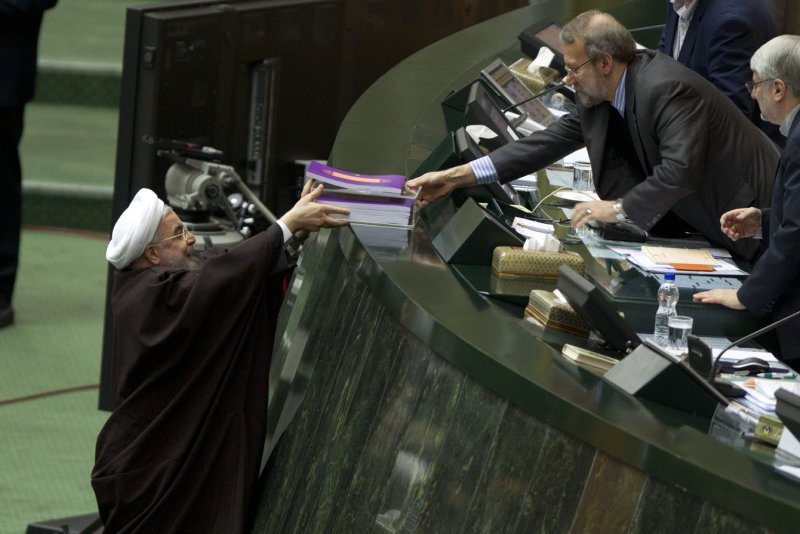Iranian President Hassan Rouhani submits his budget to the Iranian parliament in Tehran, Iran on December 8, 2013. UPI/Maryam Rahmanian |
License Photo
WASHINGTON, Dec. 20 (UPI) -- The White House vowed to veto a bipartisan Senate bill that would impose new sanctions on Iran if it violates an interim deal to curb its nuclear program.
White House spokesman Jay Carney said such a measure would damage delicate diplomacy between Iran and six world powers -- including the United States.
"We don't want to see actions that would proactively undermine American diplomacy, which is what we fear that actions like passing new sanctions -- no matter how they're structured -- would be received, both by our international partners and obviously by Iran," Carney said after 26 Democrats and Republicans introduced the legislation.
The administration hopes a comprehensive deal with Iran, ending a decade-long standoff over its nuclear program, will be a signature foreign policy achievement of President Obama's second term, the Wall Street Journal said.
The Senate's proposed "Nuclear Weapon Free Iran Act" is sponsored by Foreign Relations Committee Chairman Robert Menendez, D-N.J., and Sen. Mark Kirk, R-Ill. Other sponsors among the 13 Democrats and 13 Republicans supporting it include Sens. Marco Rubio, R-Fla., and Chuck Schumer, D-N.Y., the third-ranking Senate Democrat and a White House ally who has been publicly skeptical of Obama's diplomatic gambit with Iran.
The measure would go into effect if Iran cheats on the interim agreement or if a comprehensive deal isn't worked out within a year.
"This is a responsible, bipartisan bill to protect the American people from Iranian deception," Kirk said, adding the measure would increase U.S. leverage in negotiations toward a permanent deal.
"We don't think this action is necessary," Carney said. "We don't think it will be enacted. If it were enacted the president would veto it."
Tehran had no immediate comment, but Iranian officials have repeatedly said they would back out of current nuclear talks if Washington enacts new sanctions.
Iranian Foreign Minister Javad Zarif told Time magazine in an interview published Dec. 9 any new sanctions, even if they're conditional like the Senate bill, would kill a comprehensive deal.
They would mean "the entire deal is dead," he said when asked what would happen if Congress imposed new sanctions, even if they didn't go into effect for six months.
"We do not like to negotiate under duress," Zarif said. "And if Congress adopts sanctions, it shows lack of seriousness and lack of a desire to achieve a resolution on the part of the United States. I know the domestic complications and various issues inside the United States, but for me that is no justification."
Iran and the United States, Britain, France, Russia, China and Germany -- a group known as the P5-plus-1 because they're the five permanent U.N. Security Council members plus Germany -- reached an interim deal Nov. 24.
The deal calls for Tehran to freeze parts of its nuclear program for six months in exchange for an easing of some Western economic sanctions. During this interim period, both sides agreed to try to reach a permanent deal to end Iran's nuclear threat.
The proposed new sanctions in the Senate bill, similar to a measure the House passed in July, would enforce a total embargo on Iran's oil exports over two years and freeze Tehran's ability to access money held in foreign bank accounts.
The sanctions also seek to limit Iran's ability to make money from sectors so far not hit hard by sanctions. These sectors include mining, engineering and real estate, the Wall Street Journal said.
The Democratic heads of 10 Senate committees criticized the proposed legislation in a letter Thursday.
"New sanctions would play into the hands of those in Iran who are most opposed to the negotiations," said the letter, signed among others by Tim Johnson, D-S.D., whose Banking Committee has jurisdiction over sanctions legislation, and Dianne Feinstein, D-Calif., Intelligence Committee chairwoman.
Senate Majority Leader Harry Reid, D-Nev., who would be responsible for deciding to bring the legislation up for a vote next year, has said he is open to discussing new sanctions.
But he has also said he will avoid any measure so strongly opposed by the White House.















